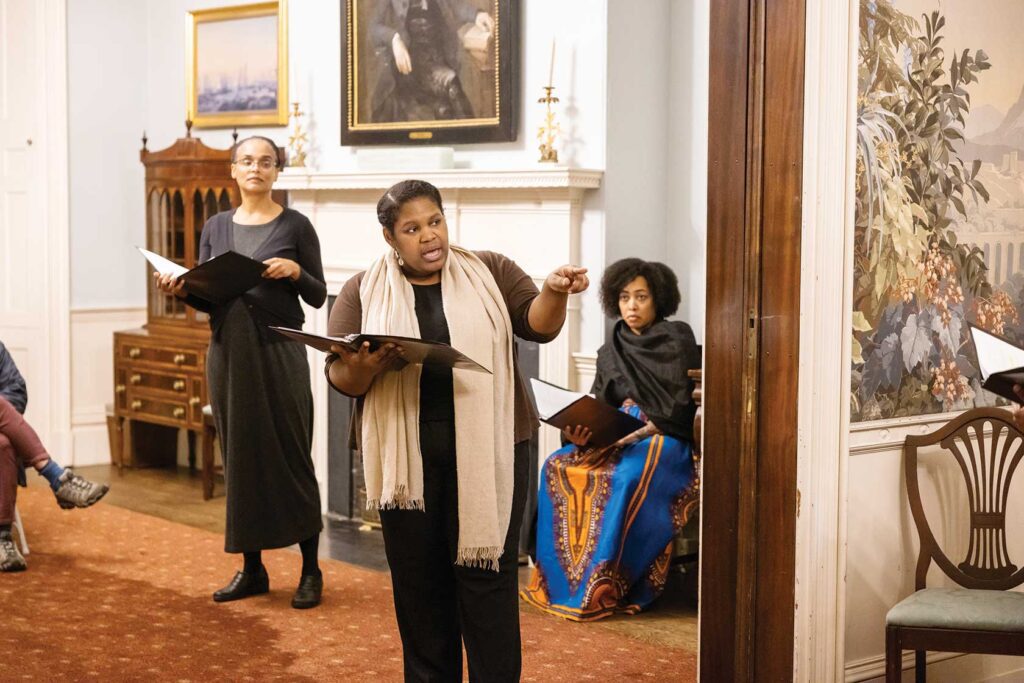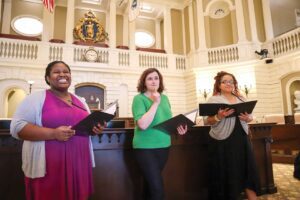Upcoming series of site-specific historical plays will center on abolition and suffrage

Banner Arts & Culture Sponsored by Cruz Companies
This month, Plays in Place and The National Parks of Boston launch “Suffrage in Black and White,” a series of three site-specific plays addressing the intersection of race and citizenship through the lens of both the abolitionist and suffrage movements in Boston. Highlighting diverse local talent, one play will debut each year through 2026.
The project has been a long time coming. The National Parks of Boston and Plays in Place, an organization that works with local cultural institutions to produce site-specific plays, began collaborating on this effort in 2020. They commissioned three original works from local playwrights and worked with artists and history professionals to bring the stories to life in the most vibrant and historically accurate manner possible.
“The stories that we are most interested in telling are the ones that have not had as much focus as they deserve,” says Jess Meyer, a producer at Plays in Place who worked extensively on the project.
Bostonians can finally enjoy some of the fruits of that labor. “A Light Under the Dome,” written by Patrick Gabridge and directed by Courtney O’Connor, is the first play in the series and will debut this month. “A New Era,” written by Miranda ADEkoje and directed by Summer L. Williams, and “Nothing But Victory!,” written by Ginger Lazarus and directed by Megan Sandberg-Zakian, are slated for the coming two years.

“A Light Under the Dome” actors Regine Vital, Bridgette Hayes and Thomika Bridwell, in 2023. PHOTO: Jess Meyer
Historical spaces are key in these productions. “A Light Under the Dome” will be performed inside the Senate Chamber at the Massachusetts State House. The story takes place in 1838 as Angelina Grimké delivers a speech advocating for abolition and women’s rights, which would have taken place in that very room.
“A New Era” focuses on Black suffragette and community leader Josephine St. Pierre Ruffin as she assembles seven powerful women of color in her home to strategize for the fight for civil and gender rights. That show will run in 2025 in King’s Chapel Parish House in Beacon Hill, near Ruffin’s former home. “Nothing But Victory!” depicts a 1915 protest for suffrage that occurred at Faneuil Hall. The performance will run in 2026 in Faneuil Hall, where the historical event took place.
Liza Stearns, National Parks of Boston’s director of visitor engagement, education and the arts, says, “As we approach the 250th anniversary of the Declaration of Independence, rigorously researched and creatively produced performing arts projects like this shine a light on the many and diverse people who have claimed their role as active citizens in shaping the country’s vision for equal rights and representation.”
“A Light Under the Dome” will run at the Massachusetts State House Aug. 12-15, with afternoon and evening shows each day. Admission is free, but visitors must reserve a spot in advance.
The productions cover real, accurate history, but they are made accessible for a modern audience. Plays in Place also doesn’t shy away from the connections to our current moment. Grimké’s speech, calling for equity among all populations, will feel strikingly familiar.
“These plays feel so modern,” says Meyer. “We often utilize the model of theater to be able to speak to not only where we come from and how far we’ve come, but also how far we have left to go.”







